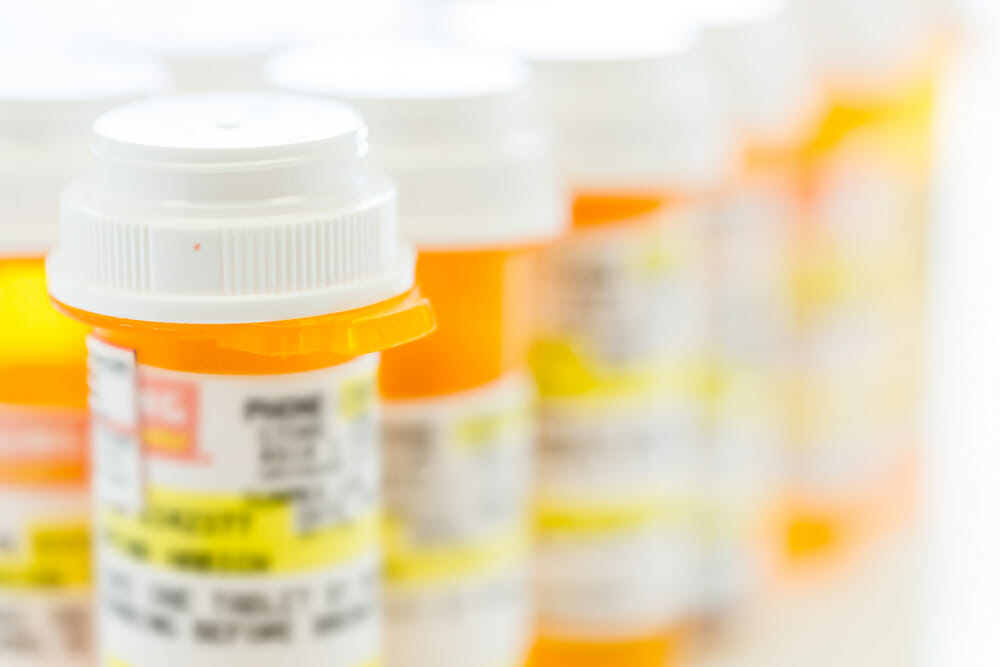Treatment & Rehab for Prescription Drug Addiction
Prescription Drug Addiction Treatment Options
Prescription drugs are prescribed by a doctor for legitimate medical purposes. However, they can be just as addictive as illegal and recreational drugs, and this is what makes them underestimated and dangerous. Some prescribed medications have psychoactive effects and any psychoactive substance can be addictive. Addicts might begin with a legitimate prescription then consume the drug beyond medical instruction, raise their tolerance and become dependent upon it as a result. Others might find prescription drugs on the black market.

Call our admissions line 24 hours a day to get help.
Addictive Prescription Drugs
Prescription drugs come in many forms for various ailments. Many of them have the potential for abuse. They can be painkillers, sleeping pills, anti-depressants, weight loss pills, or ADHD medication, as well as others. Below is a list of commonly prescribed addictive drugs. Often, they are given under a specific brand name, which we have also included in brackets.
- Codeine
- Methylphenidate (Ritalin)
- Fentanyl
- Gabapentin
- Hydrocodone
- Diazepam (Valium)
- Oxycodone (OxyContin)
- Vicodin
- Alprazolam (Xanax)
- Dexedrine
- Clonazepam (Klonopin)
- Morphine
- Meperidine (Demerol)
- Amphetamine (Adderall)
What to Expect from Treatment?
There are many forms of treatment for prescription drug addiction. Various procedures have been tried and tested, and often the exact form is tailored to the needs of the individual.
All treatments offer support from start to finish. The first stage is listening to your issues and understanding your situation. Treatment is then a balance of detox and therapy to tackle the addiction and face the reasons behind it. Lastly, aftercare is offered to keep you on track on the road to recovery.
Screening and Assessment
Different screening tools and assessment resources exist to measure the extent of substance abuse. For those suffering from a prescription drug addiction, these assessments revolve around drug dependency. They discover how much an individual centres their life on prescription drugs at the expense of happiness, health and relationships. The results come from questioning and evidence-based analysis of the answers. They are the first step in treatment.
Detoxification
Detoxification typically happens within a 7-to-10 day period to cleanse the body from toxins. The aim of any detox is to stabilise your mind and body and centre a physical and mental balance. A drug detox flushes harmful substances from your system. During the process, you also receive care when suffering from withdrawal. Specialist support and medical assistance make detoxification as safe and effective as possible.
Therapy
Therapy follows detoxification as it focuses more on the mental elements of addictive behaviour. It typically happens between 3 to 12 weeks, but therapy is tailored to the needs of the individual. The psychotherapeutic process helps to explore your relationship with prescription drugs and find the root of its issues. It also supports your steps forward as you can learn to recognise and avoid triggering behaviours and environments.
Aftercare
Aftercare is a follow-up system of support to prevent relapse. It encourages a healthier and happier future for the individual without depending upon prescription drugs. Although you might feel determined to stay on track following detox and therapy, aftercare offers the practical resources to help you stay away from old patterns of behaviour. Aftercare provides a safety net for those in the early stages of recovery, and helps those to remain committed to the programme during times of difficulty.
Withdrawal Symptoms Treatment
Medical detoxification is only given to those suffering with drug/alcohol dependency. It’s not a main treatment and would never be used for drugs like cocaine, cannabis or amphetamines.. That is because detoxing with medical assistance is both safer and more successful. Needs more research, specific drugs withdrawals don’t cause depression, its more likely that the addiction has masked symptoms etc… So the individual is better undergoing withdrawals in a safe environment. Treatment can also include being slowly weaned off a drug to minimize symptoms so a close monitoring of consumption is important.
Specific treatments for withdrawal symptoms depend upon the type of prescription drug. For an addiction to painkillers or opioids, sometimes doctors offer You’ve mentioned medical assistance above, needs to be a bit clearer. Medical/Medically assisted detoxes are only for some drugs.. Buprenorphine, methadone, or clonidine can also be used as maintenance drugs. Other treatments include anti-craving agents, antidepressants, and neuroleptics for those experiencing psychotic effects from stimulants. Some withdrawal symptoms can be deadly (alcohol, benzos, opiates) so weaning off drugs is often an option, depending upon the severity of addiction.
Dual Diagnosis
Dual diagnosis is a term used for patients who have both a mental illness and a substance addiction (Knott, 2014). The relationship between these conditions has been well explored in the medical world. It is understood that a primary psychotic disorder might lead to addictive behaviour like dependency on prescription drugs. Or abuse of prescription drugs could lead to the worsening of mental health issues. One problem might trigger the other in a predisposed individual.
The connection between mental illness and the abuse of prescription drugs has many elements. Some might use the effects of substances to deal with the symptoms of their mental illness, which is called self-medication. Dual diagnosis highlights the importance of treating both mental and physical elements of prescription drugs addiction. Even if the body cleanses in detoxification, the mental issues might remain and trigger further addictive behaviours.

How Long Does Rehab Take?
Inpatient rehabilitation can take up to 12 weeks. Each patient is evaluated and given a plan for individualised treatment. Factors like the seriousness of addiction can influence how long you stay in rehab. Therefore some programmes are much shorter than 12 weeks. But people are often referred to rehab in the most severe cases, so it can take up to 3 months for the individual to successfully undergo treatment.
Medication Used during Treatment and Rehab
Medication can be an important part of treatment for prescription drug abuse. It is often used in combination with behavioural therapies (Drugabuse, 2019). While therapy is almost always effective, pharmacological options depend upon the type of drug addiction being treated. But, in general, medication can be helpful in easing withdrawal symptoms, treating dual diagnosis disorders, and preventing relapse.
For opioid or painkiller addiction, medication like methadone might be used as a maintenance treatment. It can help make withdrawal symptoms less severe and reduce cravings. Treatment of stimulant addiction doesn’t often include pharmacological elements, but anti-craving agents might be used. Those suffering from psychosis, sometimes triggered by stimulant abuse, can be treated with antipsychotics. Similarly, antidepressants might be used for depression.
Those addicted to sedatives are often weaned off the drug as withdrawal symptoms can be severe and even fatal. Therefore, controlled medication of the drug or another sedative might be used during treatment. The treatment for prescriptive drug addiction can bring to light mental health issues that need medicated treatment, such as depression, schizophrenia or anxiety (Addictions, 2019).
Pros and Cons of Medicated Treatment
The use of medication can make treatment less traumatic and dangerous and more manageable. Mood stabilisers can control the mental issues that arise from the stress of rehab. They also start to treat the underlying mental disorders often associated with addiction. For the severe withdrawal symptoms that come from sedative addiction, medicated treatment might even be necessary to protect the life of the patient. The small elements of relief can make a big impact.
However, although medication might ease the treatment, it is still possible to undergo a detox without it. Natural detox depends upon nutritional supplements rather than pharmacological substances. Large doses can sometimes replenish what is taken away by some prescription drugs. Behavioural therapies have also been proved effective for most forms of prescription drug addiction. However, medication is not always an option, for stimulant abuse, for example.
Step Programme for Prescription Drug Addiction
The 12-step programme can be used for different types of addiction, including prescription drug addiction. It is rooted in the idea that a person should be treated holistically for addiction, considering their body, mind, and spirit. Although it is often used alongside other plans, like medicated treatment and behavioural therapy, the 12-step programme can have lasting positive success and reduce the likelihood of relapse.
Based on interaction rather than independence, the 12-step model is done in a group. Members support each other along the path to recovery and an addiction-free future. The programme has six fundamental ideas, including: admitting an inability to control addiction, recognising a higher power, and learning a new code of behaviour. Along the 12 steps, an individual takes responsibility for their past, present and future in regards to addictive behaviour.
Therapies for Prescription Drug Addiction
A bit confused by this.. There various different options. All forms of therapy focus on mental attitudes and the roots of addiction.
This deep journeying into the intentions behind unhealthy behaviour and the resolving of issues can influence recovery and reduce the probability of relapse. Therefore therapy is a very important part of the addiction treatment process.
Mindfulness
Mindfulness is a therapeutic technique in which you focus on the present moment and calmly accept emotions and thoughts without judgement. It is a state of mind encouraged by practices like meditation. Research shows that mindfulness-orientated therapy can aid addiction recovery (Drugabuse, 2018). Patients learn to pause and monitor their intentions before engaging in harmful activities thus slowly changing their patterns of behaviour. Through savouring healthier and life-affirming experiences, a prescription-drug free future becomes more accessible.
Therapeutic recreational activities
Therapy also extends beyond counselling into recreational activities. It is a type of therapy in itself that uses recreation and activity to addresses individual needs on the road to well-being and recovery (Atra-online). Such practices can also restore a healthy and independent ability to engage in life activities to prepare for a functioning everyday life. For example, art therapy encourages you to express thoughts and emotions through artwork in a free and creative way.
Behavioural therapy
Behavioural therapy consists of different therapies focusing on the mental attitudes behind addictive behaviour. It is a term that includes cognitive behavioural therapy, family therapy, contingency management, and more (Carroll and Onken, 2013). Through an awareness and analysis of behaviour patterns, individuals can recognise the roots and triggers of addiction then adapt behaviours to suit a healthier and happier addiction-free lifestyle.

The Role of Counselling in Prescription Drug Addiction Treatment and Rehab
Counselling for prescription drug addiction is done through a programme individualised for the patient.
It comes in various forms, but counselling will always aim to help you better understand your emotions and thoughts, and how they link to addictive behaviours. Counsellors are trained and experienced professionals who offer guidance and support along the road to recovery. They help a sufferer of prescription drug addiction realise they are not alone.
Group Therapy
Group therapy works with the notion of universality and recognising that others undergo similar issues and challenges of addiction. This can be an important step in realising the plausibility of change. Individuals both give and receive support, which can expand perspectives. Group therapy works with numerous structures and programmes. Seeing them work for others highlights that a life free from prescription drugs is entirely possible.
One-to-One therapy
One-to-one therapy is often offered along with other treatments as part of a recovery plan. The focus on your personal issues can dig to the roots of addictive behaviour. When uncovering thoughts and emotions, you can see how they link to an addiction to prescription drugs. By recognising the behaviours of your past, you can then learn how to go forward and avoid destructive patterns in the future.
Choosing a Treatment Centre for Prescription Drug Addiction
When choosing a treatment centre for prescription drug addiction, it is important to look for a place with strong resources, dependable services, and a system of support for individuals and their families. They must be able to create an individualised plan and guide a prescription drug abuser along the road to recovery. Ultimately, the patient should step into the potential of a healthier life and happier future when they leave the treatment centre.
Some people prefer to stay in a residential rehabilitation centre, while others would rather live at home and undergo daily treatment. Severely addicted people will possibly require a longer duration of treatment than those who are noticing the early signs of addiction. Some people want to get away from their daily routine by choosing a treatment centre abroad, while others prefer the familiar comfort of their home town. All these factors are important to consider.
Inpatient Treatment Programmes
Inpatient treatment programmes, also called inpatient rehab, occur within a residential facility. That means patients have constant access to medical support. After the assessment, you have an individualised treatment plan to follow within the centre. Inpatient rehab is often recommended for severe addiction cases when they must drastically change their routine behaviours to begin recovery. For prescription drug addicts, this might include detox and behavioural therapy.
Residential rehab is an intensive form of treatment as an individual has to step outside their daily life to begin the path to recovery. Their usual routine is replaced by a schedule of therapy, healthy living, and relaxation, often following an initial detox period. The time away from work and space away from home can enhance fresh perspectives. It is a clear step into a new life free from prescription drug dependency and addiction.
Call our admissions line 24 hours a day to get help.
Inpatient v Outpatient Prescription Drug Addiction Treatment Programmes
For inpatient treatment, you stay in a rehab centre for up to 12 weeks. Such a constant level of care and support guides an addict through detox and therapy. The intensity of the rehab can be the boost needed to change their addictive behaviours in the real world. However, it also requires you to disturb your everyday routine for up to 3 months. For some, depending on the length of your stay, it might make returning to everyday life even more difficult.
Outpatient treatment is often referred to those not physically dependent upon prescription drugs. Sometimes therapy can be enough to recognise the root of addiction and alter behavioural patterns, focusing on the mind more than the body. It is a cheaper alternative and does not disturb your daily routine, as you can still work or study and have on-going support. However, it does not offer the same intense medicated care as inpatient rehab.
Short-Term vs. Long-Term Treatment
The length of treatment depends upon the individual’s determination for change and the severity of their addiction to prescription drugs. Short-term treatment is a better option for those with a lower-level or non-physical dependency. But those who find addiction disturbing their daily life might need to undergo detox and months of therapy. But care plans and their lengths adapt to the patient’s needs, including aftercare, which might last up to a year after treatment.
Rehab Treatment Facility Types
Although treatments, detoxes and therapies often follow consistent practices, rehab facilities are not interchangeable.
Things like location and building type alter its environment. Internal factors also make a difference, such as patient age range, gender, and treatment coverage. Then you must consider your budget too. It’s important to consider all options. But the most important thing is to find a safe and comfortable place that will help you to recover from addiction.
All-Age Rehabs vs. Specific Age Group Rehabs
Some rehab treatment facilities cater to all ages facing a problem with addiction while some are specific to different age groups. One positive of age-specific rehab is that people have different needs at different stages of life. Adolescent treatment centres usually only host patients up to age 18 and might offer educational programmes to maintain schoolwork. Facilities can focus on youth-oriented therapy, setting long-term sobriety goals for the future, and offering more fun activities.
Rehab for adults might be more inclined to use medicated treatments. Therapy sessions might discuss adult themes like their role as a parent or having people dependent on them financially. Treatment centres for senior patients usually have more relaxing environments. Older patients might have common issues of grief or serious illness around their addiction. However, all-age rehab might allow people at different life stages to learn from one another in unexpected ways.
Gender-Specific vs. Mixed Gender Programmes
Some programmes are mixed gender when both males and females undergo treatment in the same facility. Many individuals find relating to people of all genders helpful in recovery as it gives a more realistic representation of the outside world. It can make a person more adaptable to life beyond rehab and help them with long-term success in overcoming addiction.
However, others prefer the relatability of a single-gender environment. Heterosexual patients might prefer gender-specific programmes to avoid the possibility of a romantic relationship. During rehab, you are encouraged to work through their addiction independently without the distraction of romance. Patients might also feel safer or more comfortable living and sleeping in an environment inhabited by the same gender and be more open in group discussions.
Treatment Near Home vs. Different City or County
Location is an important factor when choosing the right treatment facility for you. Leaving the comfort of your home environment can put distance between you and your addiction issues. It can help recovery feel like the personal journey it is and encourage a fresh start. Plus you might find it easier to commit to rehab if it isn’t as easy to return home. But being far away can also make it difficult for friends and family to visit and maintain your familiar support system.
With local rehab, you know that friends and family are close by and that your support network is there to help you through your treatment. Treatment near home is usually less expensive and can relieve some of the financial stress, allowing you to focus on recovery. However, it might be easier to fall into old habits in a familiar environment. Plus, you should choose the treatment facility best for your needs, not the most geographically convenient.
Prescription Drug Addiction Rehabs and Confidentiality
When you undergo treatment for prescription drug addiction, the last thing you should have to worry about is confidentiality. Through every step of the process, your thoughts, emotions and information are protected by professional experts. All staff safely guard your identity so you can focus on an honest and safe recovery. Plus they have a legal obligation to do so. It is also your choice whether or not to disclose that you are in rehab to your friends and family.
An important part of recovering from prescription drug addiction is not feeling judged for your behaviour. You should have the space to be honest and open with your experiences, whether in group therapy, sharing your thoughts with other patients, or in individual counselling, sharing your emotions with a single therapist. The integrity of the therapeutic alliance between patient and counsellor must be upheld to genuinely support a healthy, addiction-free life.
Questions to Ask Treatment Centres and Insurers

What are the results of rehabilitation? It’s useful to know the exact aims of the treatment centre and what they count as success, whether that’s completing a 12-step programme or kicking an addiction for life. It would also be encouraging to hear success stories from the treatment centres. But you should also listen to the reality of the hard work needed for recovery. This is also a valuable question to ask yourself. What are your expectations of the results?
What is the length of the rehabilitation programme? It is important to know how much a treatment plan will disrupt your routine.
Perhaps you will have to take three months off work. Or maybe you will need a week-long detox followed by outpatient therapy. Ultimately, the duration will depend on your individual situation. But you should prepare for how rehab will disturb your everyday life.
Does the centre use medicated treatment? You might want to know in advance how physical or pharmaceutical your rehabilitation will be. Some sense of mental preparation and knowledge about treatment might make the process a little easier to begin. An informed awareness about specific treatment details can make rehab less intimidating.
Will the centre offer nutritional plans? Many treatments include a dietary plan to encourage healthy living. A healthier diet can reduce the need for medication to treat problems like depression or sleep deprivation. Knowing that your meals will be taken care of while in rehab might be one less thing to worry about.
Does my insurance cover prescription drug rehab? Health insurance often covers substance abuse treatment in the same way as other medical needs. Outpatient care is more likely to be covered than inpatient care, which is typically more expensive. Even if your insurance does pay for treatment, there may be a time limit on the length of time for which you are covered. Therefore, it is important to check the specifics of your private insurance.
Will my insurance pay for treatment medications? Medication might be prescribed during rehab to treat withdrawal symptoms or act as maintenance drugs. The details might be hazy about whether this medication is covered by your health insurance. So it is best to explicitly ask insurers.
Is the treatment centre accredited? Licencing and certification is a good way to recognise the authority of a facility. If they are of an official standard, you can feel assured about your treatment before admission. You can guarantee that the staff are educated and experienced professionals and that resources are current and high quality. Such reassurance will boost your confidence in the treatment plan and aid the recovery process.
Prescription Drug Statistics
In the UK, prescriptions for addictive drugs have increased by 3% since 2013. Almost 8% of people talking painkillers weren’t prescribed them by a doctor (Buckley, 2018).
The death rate from fentanyl, a legally prescribed drug 100 times stronger than morphine, has risen by 540% over 3 years (Bond, 2016). In the US, prescription drug abuse is on an even larger scale. In 2017, statistics showed about 18 million people had misused prescribed medications that year (Drugabuse, 2018).
Admissions to UKAT treatment centres for prescription drug addiction rose by 22% between 2014 and 2017. In 2017, the number of painkillers prescribed by GPs rose by 17% (Tanner, 2017). A UK study showed that between 2000 and 2010, seven times more prescriptions for strong opioids were given to patients without cancer throughout the study timespan (Wilson, 2016).
In 2012, research showed that at least 32,000 people in the UK struggled with an addiction to painkillers, although it is believed to be a much high number in reality. In the same year, there were 807 deaths from prescription drug overdoses, which was a higher fatality rate than cocaine and heroin users. All these numbers are believed to be on the rise (Borland, 2013).
What Is the Success Rate?
UK rehabilitation programmes have repeatedly shown themselves to be successful in treating addiction. A 2006 DORIS study found that 30% of people admitted to a residential rehab during treatment were abstinent from drugs for 90 days after discharge. In 1995, an important National Treatment Outcome Research Study showed that 47% of people treated in inpatient rehab achieved abstinence after 5 years (Effective rehab guide).
Treatment programmes for drug abuse produce successful results. From 2017 to 2018, 48% of the 121,332 patients who finished treatment completed it successfully, free from drug dependence (GOV, 2018).

Get Help Today
If you think you might have an addiction to prescription drugs, you can get help today. Perhaps you are noticing a growing dependency on prescribed medication, including mood swings or irritability based on their availability, interrupted sleep, or a tendency to frequently visit the doctors. Maybe you are noticing their signs in someone else. Help exists through support and treatment and it is available immediately.
Call our admissions line 24 hours a day to get help.
FAQ
Sources
- Addictions.com, (2019). Addiction Treatment Medications Used In Rehab. [online] Available at: https://www.addictions.com/know-before-you-go/addiction-treatment-medications-used-in-rehab/ [Accessed 29 May 2019].
- Bond, A (2016). Why fentanyl is deadlier than heroin, in a single photo [online] Stat News. Available at: https://www.statnews.com/2016/09/29/why-fentanyl-is-deadlier-than-heroin/ [Accessed 29 May 2019].
- Borland, S (2013). A nation of prescription drug addicts: More Britons die from abusing painkillers and tranquillisers than heroin and cocaine [online] Daily Mail. Available at: https://www.dailymail.co.uk/news/article-2415779/A-nation-prescription-drug-addicts-More-Britons-die-abusing-painkillers-tranquillisers-heroin-cocaine.html [Accessed 29 May 2019].
- Buckley, J (2018). It’s no surprise that prescription drug addiction in the UK is on the rise – I should know, they nearly killed me [online] Independent. Available at: https://www.independent.co.uk/voices/prescription-drugs-addictive-codeine-pregablin-fentanyl-us-drug-crisis-nhs-a8177336.html [Accessed 29 May 2019].
- Carroll, K. and Onken, L. (2013). Behavioral Therapies for Drug Abuse [online] NCBI. Available at: https://www.ncbi.nlm.nih.gov/pmc/articles/PMC3633201/ [Accessed 29 May 2019].
- Drugabuse.gov, (2018). Prescription Opioid Misuse Treatment Leverages Mindfulness To Amplify Natural Rewards. [online] Available at: https://www.drugabuse.gov/news-events/nida-notes/2018/10/prescription-opioid-misuse-treatment-leverages-mindfulness-to-amplify-natural-rewards [Accessed 29 May 2019].
- Drugabuse.gov, (2019). Treatment Approaches for Drug Addiction. [online] Available at: https://www.drugabuse.gov/publications/drugfacts/treatment-approaches-drug-addiction [Accessed 29 May 2019].
- Drugabuse.gov, (2018). What is the scope of prescription drug misuse?. [online] Available at: https://www.drugabuse.gov/publications/research-reports/misuse-prescription-drugs/what-scope-prescription-drug-misuse [Accessed 29 May 2019].
- Executive-rehab-guide.co.uk, (n.d). Effectiveness of Residential Rehab Services. [online] Available at: http://www.executive-rehab-guide.co.uk/private-alcohol-and-drug-rehab/success-rates#_ednref2. [Accessed 29 May 2019].
- Gov.uk, (2018). Alcohol and drug treatment for adults: statistics summary 2017 to 2018. [online] Available at: https://www.gov.uk/government/publications/substance-misuse-treatment-for-adults-statistics-2017-to-2018/alcohol-and-drug-treatment-for-adults-statistics-summary-2017-to-2018#treatment-exits-and-successful-completions [Accessed 29 May 2019].
- Knott, L (2014). Dual Diagnosis [online] Patient. Available at: https://patient.info/doctor/dual-diagnosis-drug-abuse-with-other-psychiatric-conditions [Accessed 29 May 2019].
- Tanner, C (2017). Over-the-counter drug addiction in the UK is set to become more common than heroin and alcohol abuse, alarming new figures from a rehab centre reveal [online] Daily Mail. Available at: https://www.dailymail.co.uk/health/article-4580354/Addiction-prescription-pills-overtake-HEROIN.html [Accessed 29 May 2019].
- Wilson, C (2016). Addiction to prescription drugs is UK ‘public health disaster’ [online] News Scientist. Available at: https://www.newscientist.com/article/2110089-addiction-to-prescription-drugs-is-uk-public-health-disaster/ [Accessed 29 May 2019].
No matter where you live, there is a drug rehab center that can help you overcome your addiction. We'll help you find it.
Select a County



